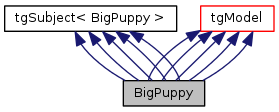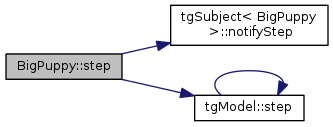|
NTRT Simulator
Version: Master
|
|
NTRT Simulator
Version: Master
|
Inherits tgSubject< BigPuppy >, tgModel, tgSubject< BigPuppy >, tgModel, tgSubject< BigPuppy >, tgModel, tgSubject< BigPuppy >, tgModel, tgSubject< BigPuppy >, and tgModel.

Public Member Functions | |
| virtual void | setup (tgWorld &world) |
| virtual void | teardown () |
| virtual void | step (double dt) |
| const std::vector < tgSpringCableActuator * > & | getAllActuators () const |
| virtual void | setup (tgWorld &world) |
| virtual void | teardown () |
| virtual void | step (double dt) |
| const std::vector < tgSpringCableActuator * > & | getAllMuscles () const |
| virtual void | setup (tgWorld &world) |
| virtual void | teardown () |
| virtual void | step (double dt) |
| const std::vector < tgSpringCableActuator * > & | getAllActuators () const |
| virtual void | setup (tgWorld &world) |
| virtual void | teardown () |
| virtual void | step (double dt) |
| const std::vector < tgSpringCableActuator * > & | getAllActuators () const |
| virtual void | setup (tgWorld &world) |
| virtual void | teardown () |
| virtual void | step (double dt) |
| const std::vector < tgSpringCableActuator * > & | getAllActuators () const |
| void | attach (tgObserver< BigPuppy > *pObserver) |
| void | notifyStep (double dt) |
| void | notifySetup () |
| void | notifyTeardown () |
| virtual void | onVisit (const tgModelVisitor &r) const |
| void | addChild (tgModel *pChild) |
| virtual std::string | toString (std::string prefix="") const |
| template<typename T > | |
| std::vector< T * > | find (const tgTagSearch &tagSearch) |
| template<typename T > | |
| std::vector< T * > | find (const std::string &tagSearch) |
| std::vector< tgModel * > | getDescendants () const |
|
const std::vector < abstractMarker > & | getMarkers () const |
| void | addMarker (abstractMarker a) |
| virtual std::vector < tgSenseable * > | getSenseableDescendants () const |
| void | addTags (const std::string &space_separated_tags) |
| void | addTags (const tgTags &tags) |
| bool | hasTag (const std::string tag) const |
| bool | hasAllTags (std::string tags) |
| bool | hasAnyTags (const std::string tags) |
| bool | hasNoTags () |
| tgTags & | getTags () |
| const tgTags & | getTags () const |
| void | setTags (tgTags tags) |
| std::string | getTagStr (std::string delim=" ") const |
Definition at line 46 of file BigPuppy.h.
|
inherited |
Add a sub-model to this model. The model takes ownership of the child sub-model and is responsible for deallocating it.
| [in,out] | pChild | a pointer to a sub-model |
| std::invalid_argument | is pChild is NULL, this object, or already a descendant |
Definition at line 122 of file tgModel.cpp.


|
inherited |
Attach an observer to the subject of the observer.
| [in,out] | pObserver | a pointer to an observer for the subject; do nothing if the pointer is NULL |
|
inlineinherited |
Get a vector of descendants sorted by type and a tagsearch. Useful for pulling out muscle groups, or similar.
| [in] | tagSearch,a | tagSearch that contains the desired tags |
Definition at line 128 of file tgModel.h.

|
inlineinherited |
Get a vector of descendants sorted by type and a tagsearch. Useful for pulling out muscle groups, or similar.
| [in] | tagSearch,a | std::string& that contains the desired tags |
Definition at line 141 of file tgModel.h.

| const std::vector< tgSpringCableActuator * > & BigPuppy::getAllActuators | ( | ) | const |
Return a vector of all muscles for the controllers to work with.
Definition at line 692 of file BigPuppy.cpp.
| const std::vector<tgSpringCableActuator*>& BigPuppy::getAllActuators | ( | ) | const |
Return a vector of all muscles for the controllers to work with.
| const std::vector<tgSpringCableActuator*>& BigPuppy::getAllActuators | ( | ) | const |
Return a vector of all muscles for the controllers to work with.
| const std::vector<tgSpringCableActuator*>& BigPuppy::getAllActuators | ( | ) | const |
Return a vector of all muscles for the controllers to work with.
| const std::vector< tgSpringCableActuator * > & BigPuppy::getAllMuscles | ( | ) | const |
Return a vector of all muscles for the controllers to work with.
Definition at line 658 of file BigPuppy.cpp.
|
inherited |
Return a std::vector of const pointers to all sub-models.
Definition at line 170 of file tgModel.cpp.

|
virtualinherited |
From tgSenseable: need to return all the children of this class. Since tgModels are tgSenseables, just return getDescendants().
For tgSenseable: just return the results of getDescendants here. This should be OK, since a vector of tgModel* is also a vector of tgSenseable*.
Reimplemented from tgSenseable.
Definition at line 191 of file tgModel.cpp.

Call tgObserver<T>::onSetup() on all observers in the order in which they were attached.

Call tgObserver<T>::onStep() on all observers in the order in which they were attached.
| [in] | dt | the number of seconds since the previous call; do nothing if not positive |

Call tgObserver<T>::onTeardown() on all observers in the order in which they were attached.

|
virtualinherited |
Call tgModelVisitor::render() on self and all descendants.
| [in,out] | r | a reference to a tgModelVisitor |
Reimplemented in tgCompressionSpringActuator, tgUnidirComprSprActuator, ConnectorTestModel, BuildTestModel, tgKinematicActuator, tgSphere, tgBox, tgRod, ContactCableDemo, tgBasicActuator, hillyMuscleNP, simpleMuscleNP, tgBoxMoreAnchors, tgBaseRigid, and tgGhostModel.
Definition at line 107 of file tgModel.cpp.

|
virtual |
Create the model. Place the rods and strings into the world that is passed into the simulation. This is triggered automatically when the model is added to the simulation, when tgModel::setup(world) is called (if this model is a child), and when reset is called. Also notifies controllers of setup.
| [in] | world | - the world we're building into |
Reimplemented from tgModel.
|
virtual |
Create the model. Place the rods and strings into the world that is passed into the simulation. This is triggered automatically when the model is added to the simulation, when tgModel::setup(world) is called (if this model is a child), and when reset is called. Also notifies controllers of setup.
| [in] | world | - the world we're building into |
Reimplemented from tgModel.
Definition at line 62 of file BigPuppy.cpp.
|
virtual |
Create the model. Place the rods and strings into the world that is passed into the simulation. This is triggered automatically when the model is added to the simulation, when tgModel::setup(world) is called (if this model is a child), and when reset is called. Also notifies controllers of setup.
| [in] | world | - the world we're building into |
Reimplemented from tgModel.
|
virtual |
Create the model. Place the rods and strings into the world that is passed into the simulation. This is triggered automatically when the model is added to the simulation, when tgModel::setup(world) is called (if this model is a child), and when reset is called. Also notifies controllers of setup.
| [in] | world | - the world we're building into |
Reimplemented from tgModel.
|
virtual |
Create the model. Place the rods and strings into the world that is passed into the simulation. This is triggered automatically when the model is added to the simulation, when tgModel::setup(world) is called (if this model is a child), and when reset is called. Also notifies controllers of setup.
| [in] | world | - the world we're building into |
Reimplemented from tgModel.
|
virtual |
Step the model, its children. Notifies controllers of step.
| [in] | dt,the | timestep. Must be positive. |
Reimplemented from tgModel.
|
virtual |
Step the model, its children. Notifies controllers of step.
| [in] | dt,the | timestep. Must be positive. |
Reimplemented from tgModel.
|
virtual |
Step the model, its children. Notifies controllers of step.
| [in] | dt,the | timestep. Must be positive. |
Reimplemented from tgModel.
Definition at line 677 of file BigPuppy.cpp.

|
virtual |
Step the model, its children. Notifies controllers of step.
| [in] | dt,the | timestep. Must be positive. |
Reimplemented from tgModel.
|
virtual |
Step the model, its children. Notifies controllers of step.
| [in] | dt,the | timestep. Must be positive. |
Reimplemented from tgModel.
|
virtual |
Undoes setup. Deletes child models. Called automatically on reset and end of simulation. Notifies controllers of teardown
Reimplemented from tgModel.
|
virtual |
Undoes setup. Deletes child models. Called automatically on reset and end of simulation. Notifies controllers of teardown
Reimplemented from tgModel.
Definition at line 697 of file BigPuppy.cpp.

|
virtual |
Undoes setup. Deletes child models. Called automatically on reset and end of simulation. Notifies controllers of teardown
Reimplemented from tgModel.
|
virtual |
Undoes setup. Deletes child models. Called automatically on reset and end of simulation. Notifies controllers of teardown
Reimplemented from tgModel.
|
virtual |
Undoes setup. Deletes child models. Called automatically on reset and end of simulation. Notifies controllers of teardown
Reimplemented from tgModel.
|
virtualinherited |
Returns the tag names of this model and its children
| [in] | prefix | a string to append to |
Definition at line 152 of file tgModel.cpp.
